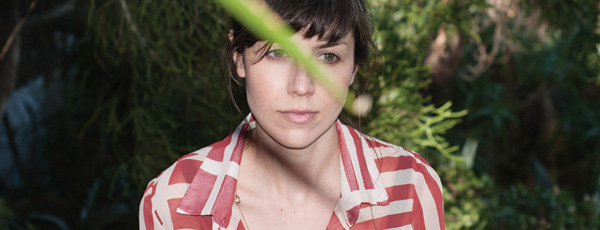
Tracks
Julia Holter: "World"
from Loud City Song (Domino; 2013)
By Robin Smith | 8 July 2013
Julia Holter’s career is one long diss track on bedroom pop. Shots fired, 2012: “I would get emails from people with the shittiest music, people who were just, like, puking into the microphone”, she told Pitchfork, referring to her time working for small-time label Human Ear, and pointing a finger at self-described artistes who use the equipment given to them like they use unwanted hand-me-downs; reproaching it, their only decent act is to keep it out of the trash. I’ve heard enough of what Holter’s talking about by now to sense the bullshit: I’ve realized Best Coast never bothered to read the garage rock manual, or else she read it way too literally, assuming her apartment and throne of weed would make the music what it is. I’ve realized there will always be people who think the main point of a Nick Drake record is that anyone can play folk music. And I’ve realized that while Holter’s lesson is harsh, it’s telling in a musical landscape where a hand imprint on wet cement would be considered intimate art. Just because it exists doesn’t mean it should.
Holter knows there’s nothing more restrictive than pulling the curtains to and playing that cheap classical guitar your friend passed down to you. Death to false bedroom pop; lean out of your window and see everything. The beautifully orchestrated Ekstasis (2012) shunned the room it was recorded in, bursting from it the same way Holter sought to burst from her own body. The album shimmered, keyboard chords and presets sounding dated, but not tied to any earthly context, and it also droned, moving as if four walls couldn’t contain it. In that way, Holter’s music feels like a spiritual successor to The Glow, Pt. 2 (2001): she’s a Phil Elvrum with a lot of electronics and some very baroque indulgences, taking a confined space and turning it into a turbulent new realm. That’s how to write fantasy.
“World,” taken from the forthcoming Loud City Song, meets the street from the window. Written about Holter’s hometown Los Angeles, it’s a song that feels city life: bad for claustrophobics, worse for agoraphobics. Nobody wins. The album’s opener, it introduces LA shapelessly, evoking the feeling of finding the road home for the first time. It’s an amorphous song, at least initially, full of different melodic experiments that wind into one another but never touch. The first time I heard it I felt completely lost—its ominous, sparingly intoned minor key sent up warning signals—but stumbling around it helped. Holter sings the shit out of it; she goes a cappella moments before sparse cello and trumpet accompaniments come in, waiting for the city to wake up around her. “World” keeps imagining new scenes, at times finding Holter lost on the street (“I don’t know how I wear a hat so much / Even when I run the city can’t see my eyes,” she sings, obscuring herself in plain sight), and at others perched on the apartment balcony, an admission that her bedroom is just another part of this deafening framework of people and buildings.
“World” is baroque with sharp edges. It takes on less pop convention than Holter’s drones, even, and yet it’s as sparsely constructed as the bedroom music she detests. Holter hasn’t made me hate all that the vague “bedroom” tag entails, necessarily, but she raises valuable questions about its definition. Like: is this a genre? Or is it an experience? There are a lot of charming idiots making music with the belief it belongs to their homes, but there are also albums that go home from the studio. Nick Drake didn’t really make music about the bedroom, but he certainly knew you might listen in yours. Holter’s brooding apartment story has a different kind of intimacy, because “World” feels like it’s trapped in the bedroom, not made for it. The song’s final, horrific question—“How can I escape you?”—is for where the walls meet.





